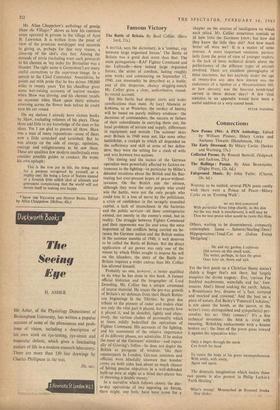Famous Victory
A BATTLE, says the dictionary, is a 'combat, esp. between large organised forces.' The Battle of Britain was a good deal more than that. The
main protagonists--RAF Fighter Command and the Luftwaffe—were indeed large organised forces; the series of combats, lasting roughly nine weeks and culminating on September 15, 1940, can reasonably be described as a battle; and of this desperate, chancy slogging-match Mr. Collier gives a clear, authoritative, round- by-round account.
But this battle had deeper roots and wider ramifications than most. At (say) Alamein or Kohima, as at Waterloo, the verdict of history will be based on purely military evidence: the decisions of commanders, the success or failure of their subordinates in carrying them out, the local problems of terrain and supply, differences in equipment and morale. The summer skies over Britain in 1940 were not, like most other battlefields, a cockpit in which all depended on the sufficiency and skill at arms of her defen- ders; they were the setting for a clash of wills and wits between two nations.
The timing and the tactics of the German operation were powerfully affected by factors ex- traneous to the fighting—in particular by Hitler's deluded intuitions about the British and his fluc- tuating but ever-present hopes of peace-without- invasion. On the British side the airmen, although they were the only people who could win the battle, were not the only people who could lose it; a loss of nerve by the politicians, a crisis of confidence in the savagely assaulted capital, a lack of staunchness in the factories and the public services—all these contingencies existed, not merely in the enemy's mind, but in reality. The struggle between Fighter Command and their opponents was far and away the most important of the conflicts being carried on be- tween the German nation and the British nation in the summer months of 1940; it well deserves to be called the Battle of Britain. But the direct application of air power was only one of the means by which Hitler sought to impose his will on the islanders; the story of the Battle for Britain requires a wider canvas than Mr. Collier has allowed himself.
Probably no one, however, is better qualified to do what he has done in this book. A former official historian and the biographer of Lord Dowding, Mr. Collier has a unique command of source material. He traces the pre-war growth of Britain's air defences from their Heath Robin;, son beginnings in the Thirties; he pays due tribute to the pioneer of radar and makes clear not only the vital part it played, but exactly how it played it; and he sketches, lightly and objec- tively, the various clashes of personality which at times mildly bedeviled the operations of Fighter Command. His accounts of the fighting, and his assessment of the relative importance of its different phases, are admirable. If he makes the most of the Germans' mistakes—and especi- ally of.Goering's follies—he does not depict the British as paragons of wisdom; 'like their counterparts in London, German ministers and officials were blissfully unaware that bomber crews on both sides had about as much chance of hitting precise objectives in a well-defended built-up area at night as a blind dart-player has of throwing a double twenty.'
In a narrative which follows closely the day- to-day operations of two opposing air forces, there might, one feels, have been room for a
chapter on the sources of intelligence on which each relied. Mr. Collier sometimes reminds us of how little the Germans knew; but how did they know the little they did? And how much better off were we? It is a matter of some interest. A more important omission, particu- larly from the point of view of younger readers, is the lack of basic technical details about the performance of the different types of aircraft involved. There are excellent photographs of these machines; but has anybody under the age of twenty-five any idea how limited was the endurance of a Spitfire ur a Messerscnmitt 109, or how derisory was the heaviest bomb-load carried in those distant days? A few vital statistics in an appendix would have been a useful addition to a very sound book.

































 Previous page
Previous page